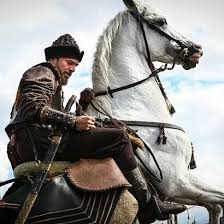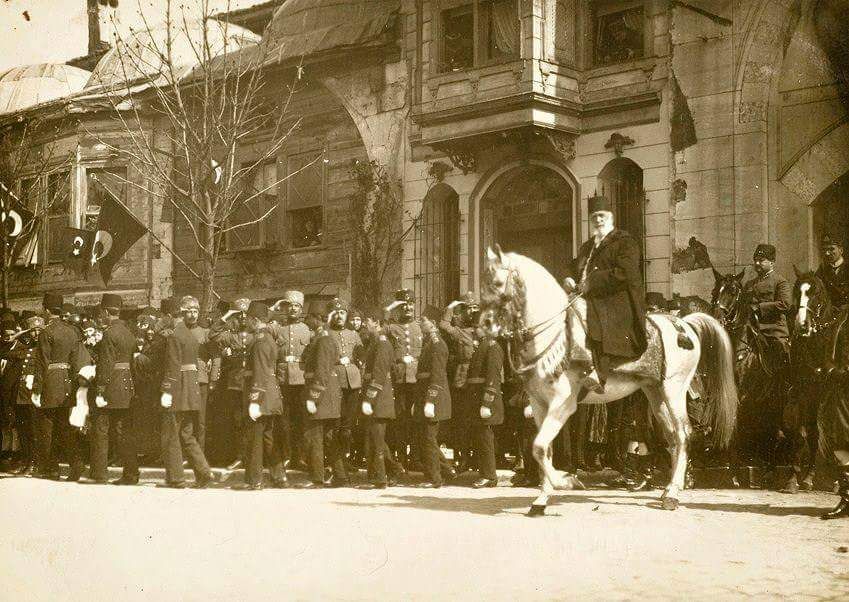


- The first and most important reason I started watching Ertugrul (and continued) was his confidence, it was admirable and beyond belief. We need our young boys to emulate this.
- Trust in Allah SWT, look at Ertugrul and all the beys. Especially Suleiman Shah, when he goes to get his son from Karyatkor. He has a sword to his neck, despite this, he trusts in Allah SWT.
- The courage of the people of Kayi tribe. Even their womenfolk are courageous and will put up a sword fight with any man.
- Live simple. Notice there is no extravagance, how simply they live and what they eat and how they dress. Contentment is a great blessing from Allah SWT.
- Know that death is always around the corner. See how they don’t keep much hope on life, the most unreliable thing in life is life itself.
- Don’t trust anyone too much. The brother of Suleiman Shah, Kurdoglu and Selcan Hatun (in series 1) were not trustworthy. Notice how they lie to their own family and try to kill them. You have to be sharp at all times.
- Beware of enemies, keep friends close keep enemies closer. Stay vigilant at all times, there can be enemies in your own circle.
- Observe how one lie, one liar can cause bloodshed and war. See how Kurdoglu causes rifts and friction to tear the tribe apart. We need to control our tongues.
- Muslim unity is important, people who divide us are a Fitnah. We must not look at colour, language and caste. Kayi and Dodurga when they unite they are strong.
- Black magic and poison are common, they exist and are real. A wife can even do it to her own husband.

- Follow your traditions and principles your parents and grandparents taught you. More importantly, follow al-Islam.
- Men need to control their womenfolk and be on top of them, Islam says ‘men are protectors.’ Look how out of control Selcan Hatun gets, because Gundogdu is not brave enough.
- Some women have long and sharp tongues, their tongues need to be caged. This is obvious in Aytalon and Goncagul Hatun.
- Being older in the family doesn’t necessarily mean you are wiser, Ertugrul is younger than Gundogdu. But sometimes, well more often than not Ertugrul makes wiser and braver decisions.
- The family relationship is important, unity and brotherhood. Respecting each other and obeying your parents. You will find this in Suleiman Shah and his sons, also in front of their mother too. Deep respect.
- A father should be the pivot of the family, Suleiman Shah was very well respected.
- A good leader needs good ministers/waziers, people to take counsel from and advice.
- A good leader also needs a good wife, Mother Hayme is bedrock support.
- Adab is important in Islam, with your family, the community and all human beings.
- Your appearance and identity should not change, no matter where you live.

- Speak the truth even if everyone is against you, just like Ertugrul followed his intuition against Gundogdu. Especially when he was accused by Kurdoglu and Kocabash for killing the Alps.
- Be careful whom you marry, marrying the wrong person can wreck your life and expose your secrets. Just like Gokce eavesdrops for Tugtekin.
- If you lie and accuse people you will be caught eventually, Selcan Hatun slandered Aykiz and faced the consequences.
- Take time to think and make wise decisions, one can observe how Ertugrul is never hasty.
- Learn to take blessings and Dua from your parents, also from your elders too like Suleiman Shah’s sons do.
- Never forego principles.
- Sometimes women must think of the consequences they can cause and damage they can do with their tongues.
- Learn to give your life for Allah, which is evident in all the Beys.
- The truth doesn’t always make sense and the odd don’t always add up, be astute.
- Tawakkul, trust in Allah. The best example is Imam Ibn Arabi RH.

- Constantly remember Allah in your heart, do dhikr excessively.
- Look for advice and guidance in the stories of the Prophets (peace be upon him).
- Naivety is a dangerous disease, Gundodgu is blatantly naïve and pays the price for it.
- Sweet words are poisonous, Goncagul Hatun is an expert in this field but it only lands her in trouble in the end.
- Learn to have mercy on your young ones, Allah has blessed every human being with some hidden talent. We just need to discover it.
- Take advice and counsel form your elders, you don’t have experience of everything. But believe me, experience is everything!
- Learn archery and teach it to your young boys.
- Horse riding is from the Sunnah.
- Keep fit, healthy and strong, always be on alert from the attack of enemies.
- Traitors exist in every era, Kocabash, Kundoglu and Selcan Hatun.

- A good mother is always overlooking her family and being vigilant. Mother Hayme is super sharp and wise.
- Be considerate and care for each other, Bamsi, Turgut and Dogan are unbreakable.
- Repent to Allah after mistakes, Selcan’s crimes were heinous but she still did tawbah.
- Criminals should be punished no matter who they are, Kurdodglu was beheaded.
- Sometimes people in power abuse their positions, Sadettin Kobeck wasn’t trustworthy and abused his authority.
- Anger is dangerous and clouds your judgement, there is ample evidence of this in Tugtekin.
- Friends can become enemies and enemies become friends, Selcan Hatun changed her life with a U-turn in series 2. Love and hate in moderation.
- Liars will do anything to hide the truth, Goncagul killed the old woman to hide Aytolun’s secrets. However, she was later exposed too.
- A man will do anything for power, Gumestekin Bey played tricks with Sadettin Kopec for power and politics. Sadly, this ended in his death.



TBC for series 3 and series 4…
Ismail ibn Nazir Satia (one who is in dire need of Allah’s forgiveness, mercy and pleasure)
1 Safar 1440
